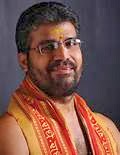The Process of Yoga : 1.4. Swami Krishnananda
-----------------------------------------------
Tuesday, September 29, 2020.
Chapter 1: The Spirit of Life -4.
----------------------------------------------
1.
But why life should be so dear, is our question again. We are entering into the spirit of all things. Why should life be so dear to us? We have many other things which are perhaps more endearing and more beautiful in this world. We have enchanting atmospheres, transporting beauties in the world. Why should we be prepared to give up all these wonders of creation and cling to this thing called life which we cannot see, which we cannot understand, and which seems to be nowhere within the ken of our perception? Why do we cling to life even if we have to lose everything else? This is the spirit of things, which eludes the grasp of our understanding. The spirit cannot be known so easily. We cannot know what life is because we cannot know what spirit is. Life and spirit are the same. We are so much engaged in the form of life, so busily entangled in its appearances and shape that we have found no time to go deep into the spirit of life. We have no time even to breathe. We are so busy, whatever be our profession. Everyone is so very busy that he or she has hardly any time to sleep. The moment one gets up, once again there is a busy tangle of life.
2.
One of the interesting features of the principle of life is that it will not give us time to think as to what it is. Sometimes people call this maya, the inscrutable power that seems to be pervading all creation, preventing people from knowing what life is. It is inscrutable, indefinable. No one knows where it is, and yet it seems to be everywhere, equally grasping and controlling everyone and everything in creation. Life and spirit seem to be one and the same thing. And all our struggles, all our sweating and labour, all our efforts and aspirations seem to ultimately be directed to the goal of knowing what life is and taking the best of it.
3.
To take the essence of life and live it at its best is also to know what life is. An ignorant person cannot be a happy person. The greater is our knowledge, the greater also is our happiness. This is something well known to us, having lived practically in this world. The wider and more intense is our understanding of a thing, the greater is our capacity and power over that thing. Our control over things increases in proportion to our knowledge of things. The lesser we understand a thing, the lesser also is our power over it, so that when we do not understand life, we cannot have any control over it. It will control us. We are puppets in the hands of nature, as it were. We are tossed hither and thither by fate and Providence, and we do not have any say in crucial matters in life, all because of the fact we have no knowledge of anything. We are ignoramuses of the first water, in matters final and crucial. We seem to be very wise in small things, in matters that are only on the surface, but we know next to nothing about profounder things.
4.
Therefore, we have contented ourselves with merely a surface view of things. We neither want to know the depths of things, nor have the time to know it. We have no time because we are busy. We have no aspiration to know it because we have not yet been properly put into the right educational career in the university of life itself. We have been satisfied with our little earning, with our little paper degree, and we have been carried astray by the wind of public opinion which can drive us in any direction it likes, so that we have not known up to this time our own worth or the real worth of anything in life. Hence, whatever be our learning, we are unhappy persons. Whatever be the position we occupy in society, we are finally sorrowing hearts. We have some complaint to make about everything in life, whatever be our possession, whatever be our education and learning or status.





Comments